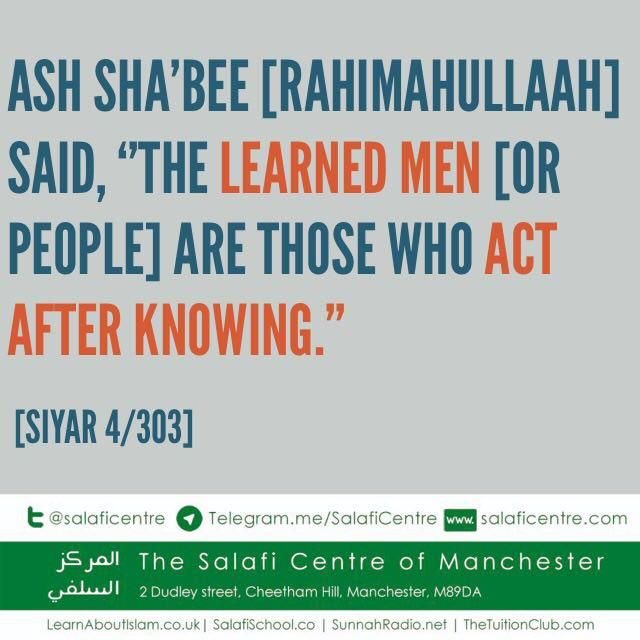In The Name of Allah, The Most Merciful, The Bestower of Mercy.
Imam Ibn Al-Qayyim [may Allah have mercy upon him] said:
The loftiest ambition in seeking knowledge is to acquire knowledge of the Qur’an and the Sunnah- to be granted understanding by Allah (i.e. to be granted Tawfeeq to acquire sound knowledge) and through the Sunnah of the Messenger, and to familiarise oneself with the boundaries of the revelation (i.e. not going into excess or being lax in its rulings). And the most pointless ambition of knowledge seekers is to confine their ambitions to following strange issues and what has neither occurred nor been revealed; or familiarising oneself with the variations in viewpoint and exploring the statements of the scholars, without aiming to learn which of those statements is correct. Little is there to benefit from the knowledge of these people. (1)
To begin, take great attention to Imaam Ibn Al-Qayyim’s comment regarding one of the signs of a lack of lofty ambition in the path of knowledge, which is “familiarising oneself with the variations in viewpoint and exploring the statements of the scholars, without aiming to learn which of those statements is correct. Little is there to benefit from the knowledge of these people”.
Without a doubt, Abu Makkah and his allies have shown a lack of lofty ambition in the Fitna of Dr Muhammad Bin Haadi because they have no evidence to support their defence of him, just as Dr Muhammad lacks evidence to support his false Tabdee. However, they have wilfully chosen extremism and stubbornness in this matter over sound evidence and humility, clinging to flimsy claims and desperately searching for lame excuses to persist upon error. Read: http://www.manhaj.com/manhaj/articles/uyryh-documents-and-resources-for-countering-and-exposing-the-musafiqah.cfm
Second, Abu Makkah should focus on one of those very matters that a seeker of knowledge must always keep in mind, rather than futilely attempting to demonstrate if Shaikh Abu Khadeejah has been given Tawfeeq in the path of knowledge. Imaam Muhammad Ibn Saalih Al-Uthaymeen [may Allaah have mercy upon him] said: If one asks, “How can sincerity in the pursuit of knowledge be (attained)?” We say: Sincerity in seeking knowledge can be attained by making an intention for the following:
To fulfil Allah’s command because Allah [The Exalted] commanded it (i.e. to seek knowledge). Allah said: [فَاعْلَمْ أَنَّهُ لَا إِلَٰهَ إِلَّا اللَّهُ وَاسْتَغْفِرْ لِذَنبِكَ- So know (O Muhammad) that La ilaha ill-Allah (none has the right to be worshipped but Allah), and ask forgiveness for your sin. (Surah Muhammad Ayah19)] Therefore, Allah [Glorified and Exalted be He] strongly urged (a person) to acquire knowledge, because strongly encouraging something entails having love for it, being pleased with it, and commanding it.
To preserve Allah’s Shariah because preserving Allah’s Shariah can be accomplished through learning, memorisation, and writing.
To protect and defend the Shariah because without scholars, no one would have protected or defended Shariah. As a result, we see people of knowledge such as Shaikhul Islaam Ibn Taymiyyah and others repelling ahlul bidah and exposing the fallacy of their innovations (in religious practice). We can see that they accomplished a lot of good.
To follow Muhammad’s Shariah because you cannot follow his Shariah until you learn about it. (2)
Third, Abu Makkah and his associates must remember that even if one has a lot of knowledge, one must also be trustworthy. Imaam Muhammad Ibn Saalih al-Uthaymeen [may Allah have mercy upon him], “We add trustworthiness as an additional characteristic alongside competence since competence is a strength that must be accompanied by trustworthiness. Allah said:
إِنَّ خَيۡرَ مَنِ ٱسۡتَـٔۡجَرۡتَ ٱلۡقَوِىُّ ٱلۡأَمِينُ
Indeed, the best one you can hire is the strong and the trustworthy.
[Surah Al-Qasas. Ayah 26]
A scholar may be proficient and vast in knowledge, capable of deriving and explaining subsidiary issues from fundamental principles, as well as categorising, distinguishing, and placing various subject matters in their proper place, but he is not trustworthy and may misguide you from where you do not know. (3)
Indeed, Abu Makkah and his followers have no choice but to humble themselves and submit to the truth. However, there are dangers for those who are taken aback by their ideas or have ulterior objectives. We should all be wary of these perilous things that prevent humankind and Jinn from yielding to the truth. Imaam Ibn Al-Qayyim [may Allaah have mercy on him] gives the following reasons:
Ignorance: This reason is mostly what overwhelms the majority of people, for indeed the one who is ignorant of something will show enmity to it and its people. If in addition to this reason, (the person) hates the one who commands him to (follow) the truth, and harbours enmity and envy, then this (i.e. reason behind being prevented from accepting the truth) becomes more intense. If in addition to this, it (i.e. the truth) opposes the ones close to his heart, his customs, the one who nurtured him, the ways of his forefathers and the ones he loves and exalts, then this (i.e. the reason behind being prevented from accepting the truth) becomes even more intense. If in addition to this, he carries a wrong perception that the truth he is being called to (is an obstacle to) his status, honour, desires and goals, the (reason behind being prevented) from accepting the truth becomes very intense. If in addition to this, he fears his companions, his family and his people (i.e. due to the harm he anticipates) against himself, his wealth and his status – just as what happened to Heraclius, the king of the Christians in Shaam during the era of Allaah’s Messenger [peace and blessings of Allaah be upon him], then the reason (behind being prevented from accepting the truth) increases even greater because indeed Heraclius knew the truth and he had the desire to accept Islam, but his people did not obey him, so he feared for himself and thus chose disbelief over Islaam after the guidance was made clear to him.
Envy: It is one of the greatest causes (behind being prevented from accepting the truth) because indeed it is an ingrained disease in the soul. The envier sees that the one he envies has been given virtue over him or has been given the likes of that which he has not been given; therefore this envy prevents him from complying with (the truth). Iblees was not prevented from prostrating to Adam [i.e. out of respect, when Allaah commanded him and the angels to do so], except out of envy, because when he saw that Aadam [peace be upon him] was given virtue and raised above him, he chose disbelief over Eemaan, even though he used to be in the company of the angels.
This disease is what prevented the Jews from believing in Eesaa the son of Maryam [peace be upon both him and his mother], even though they knew -without a doubt – that he was a Messenger of Allaah, who came with clear proofs and guidance, however, envy led them to choose disbelief over Eemaan and complied with it, even though they were a nation amongst whom were Rabbis, scholars, Zuhhaad [i.e. those who abstained from those lawful but unnecessary pleasures of the worldly life], judges, kings and rulers.
Fear of losing one’s status and prestige: Conversation between Abu Jahl and His Nephew Al-Musawwar Bin Makhzamah
Al-Musawwar Bin Makhzamah: ‘’O my uncle! Did you use to accuse Muhammad of lying before he started saying what he says now [i.e. his call to Tawheed]? Abu Jahl: “By Allaah, indeed Muhammad was a trustworthy young man amongst us and we have never experienced lying from him. Al-Musawwar Bin Makhzamah: “O my uncle! So why is it that you do not follow him?” Abu Jahl: “O son of my sister! We competed with Banu Haashim in nobility [i.e. which clan is more noble], so they used to feed [the pilgrims] and we used to feed the [pilgrims]; they used to provide water for [the pilgrims] and we used to provide water for [the pilgrims]; they used to give protection [to the destitute] and we used to give protection [to the destitute] until we were equal [i.e. in competing one another for nobility]. Then they said, “There is a Prophet from us”, so when are we going to get something similar to this!!
Conversation between Abu Jahl and Akhnas Bin Shuraiq
Akhnas Bin Shuraiq said to Abu Jahl on the day of Badr [i.e. the battle of Badr]: “O Abul Hakam! Inform me about Muhammad, as to whether he is a truthful person or a liar, for indeed there is no one here from Quraish who will hear our speech! Abu Jahl replied to Akhnas: “Woe to you! By Allaah, indeed Muhammad is a truthful person and Muhammad has never lied, but if Banu Qusay takes the leadership, the position of gatekeepers of the Kabah, providers of water for the pilgrims and Prophethood [i.e. the Prophet Muhammad is from their clan], then what will the rest of Quraish have?! (4)
Al-Allaamah Abdur Rahmaan Al-Mu’allimee [may Allaah have mercy upon him] said: To oppose desires – by way of action – for the sake of the truth is a manifest affair due to the obligation and difficulty it involves, and this can be viewed from different angles as follows: a person sees that by acknowledging the truth, it would necessitate that he has acknowledged that he was upon falsehood because a person is nurtured upon a religion, creed, school of thought or views, which he acquired from his nurturer and teacher, considers it to be the truth and followed it for a long time. Then when it becomes clear to him that (the religion, creed, view, or school of thought) is false, it becomes difficult for him to acknowledge, just like when his forefathers, ancestors or the one he follows are upon a (particular) way and its falsity is clarified for him because he sees that their deficiencies necessitate his own deficiencies, and an acknowledgement of their misguidance or errors necessitates his own.
It may be that clinging to falsehood gave him prestige, fame and a livelihood, so it becomes difficult for him to acknowledge that (what he is upon is) falsehood and thus all those benefits (i.e. the fame, prestige, livelihood etc) would disappear.
It may be that a person is upon ignorance or falsehood, then another person comes along and clarifies the proofs for him, so he sees that by acknowledging such proofs, it would necessitate that he is lacking (in understanding) and that it was that person who guided him. And due to this we find that it is not difficult for some of those attributed to knowledge to acknowledge their mistakes when it becomes manifest to them in their research and studies, but it becomes difficult for them if it was others who clarified such mistakes.
When another person clarifies the truth for him, he sees that acknowledging such truth would necessitate an acknowledgement of the clarifier’s virtue, knowledge and correctness due to that clarification, and thus that becomes great in the eyes of the people and many people follow him [i.e. the person who clarified the truth]. So you will find some of those attributed to knowledge being eager to prove the mistakes of other scholars even if that is done by way of falsehood due to envy and seeking to diminish their status amongst the people.
To oppose desires for the sake of the truth -in affairs of knowledge and creed- can indeed be difficult to accomplish, therefore it requires (sincere) research and contemplation. And in this regard, one needs to ask the scholars and benefit from them, adhering to the fear of Allah, and seeking the Tawfeeq of Allah and guidance. (5)
Al-Allaamah Abdur Rahmaan Bin Yahyah Al-Mu’allimee [may Allaah have mercy upon him] also stated: Ponder on the fact that truth is noble and falsehood is lowly. Ponder on the Greatness of Allaah [The Mighty and Majestic]- the fact that Allaah is the Lord of the entire universe, Allaah loves truth and hates falsehood, and that the one who follows truth is deserving of the Pleasure of the Lord of the universe. Allaah [Glorified be He] will be his protector in the worldly life and the Afterlife by choosing for him everything that is good, better, more beneficial, more perfect, more noble and loftier until Allaah removes his soul whilst being pleased with him. Then Allaah raises him, brings him close and makes him dwell in paradise with honour- in permanent bliss and eternal nobility which no imagination can fully conceive its greatness. He should ponder on the fact that the one who clings to falsehood is deserving of the displeasure, anger and punishment of the Lord of the universe, and if he receives anything of worldly bliss, then indeed that is only a means of humiliating him in order that he is increased in being distanced from Allaah so that the painful torment of the afterlife is multiplied for him, which no imagination can fully conceive its severity. He should ponder on the bliss of the worldly life [i.e. temporary] as compared to the pleasure of the Lord of the universe and the bliss in the afterlife [i.e. eternal], compare the misery of the worldly life to the displeasure of the Lord of the universe and the punishment in the afterlife [i.e. the severest punishment in this life is nowhere equal to punishment in the afterlife]. He should ponder on the statement of Allaah [The Mighty and Majestic]:
وَقَالُواْ لَوۡلَا نُزِّلَ هَـٰذَا ٱلۡقُرۡءَانُ عَلَىٰ رَجُلٍ۬ مِّنَ ٱلۡقَرۡيَتَيۡنِ عَظِيمٍ
أَهُمۡ يَقۡسِمُونَ رَحۡمَتَ رَبِّكَۚ نَحۡنُ قَسَمۡنَا بَيۡنَہُم مَّعِيشَتَہُمۡ فِى ٱلۡحَيَوٰةِ ٱلدُّنۡيَاۚ وَرَفَعۡنَا بَعۡضَہُمۡ فَوۡقَ بَعۡضٍ۬ دَرَجَـٰتٍ۬ لِّيَتَّخِذَ بَعۡضُہُم بَعۡضً۬ا سُخۡرِيًّ۬اۗ وَرَحۡمَتُ رَبِّكَ خَيۡرٌ۬ مِّمَّا يَجۡمَعُونَ
وَلَوۡلَآ أَن يَكُونَ ٱلنَّاسُ أُمَّةً۬ وَٲحِدَةً۬ لَّجَعَلۡنَا لِمَن يَكۡفُرُ بِٱلرَّحۡمَـٰنِ لِبُيُوتِہِمۡ سُقُفً۬ا مِّن فِضَّةٍ۬ وَمَعَارِجَ عَلَيۡہَا يَظۡهَرُونَ
وَلِبُيُوتِہِمۡ أَبۡوَٲبً۬ا وَسُرُرًا عَلَيۡہَا يَتَّكِـُٔونَ
وَزُخۡرُفً۬اۚ وَإِن ڪُلُّ ذَٲلِكَ لَمَّا مَتَـٰعُ ٱلۡحَيَوٰةِ ٱلدُّنۡيَاۚ وَٱلۡأَخِرَةُ عِندَ رَبِّكَ لِلۡمُتَّقِينَ
And they say: “Why is not this Qur’an sent down to some great man of the two towns (Makkah and Ta’if)?” Is it they who would portion out the Mercy of your Lord? It is We Who portion out between them their livelihood in this world, and We raised some of them above others in ranks, so that some may employ others in their work. But the Mercy (Paradise) of your Lord (O Muhammad) is better than the (wealth of this world) which they amass. And were it not that all mankind would have become of one community (all disbelievers, desiring worldly life only), We would have provided for those who disbelieve in the Most Beneficent (Allah), silver roofs for their houses, and elevators (and stair-ways, etc. of silver) whereby they ascend, and for their houses, doors (of silver), and thrones (of silver) on which they could recline, and adornments of gold. Yet all this (i.e. the roofs, doors, stairs, elevators, thrones etc. of their houses) would have been nothing but an enjoyment of this world. And the Hereafter with your Lord is only for the Muttaqun”. [Surah Az-Zuhkruf. Verses 31-35] (6)
We ask Allah:
اللَّهُمَّ أَصْلِحْ لِي دِينِي الَّذِي هُوَ عِصْمَةُ أَمْرِي
وَأَصْلِحْ لِي دُنْيَايَ الَّتِي فِيهَا مَعَاشِي
وَأَصْلِحْ لِي آخِرَتِي الَّتِي فِيهَا مَعَادِي
وَاجْعَلِ الْحَيَاةَ زِيَادَةً لِي فِي كُلِّ خَيْرٍ
وَاجْعَلِ الْمَوْتَ رَاحَةً لِي مِنْ كُلِّ شَرٍّ
O Allah! Rectify my religion for me, which is the safeguard of my affairs; rectify my worldly [affairs], wherein is my livelihood; and rectify my Afterlife to which is my return, and make life for me [as a means of] increase in every good and make death for me as a rest from every evil. [Saheeh Muslim Number: 2720]
To be continued…InShaaAllah
Ref 1: An Excerpt from Al-Fawaa’id. page: 99. Slightly paraphrased
Ref 2: An Excerpt from “Sharh Hilyah Taalib Al Ilm”. pages 16- 17. Slightly paraphrased
Ref 3: An Excerpt from “Sharh Hilyati Taalibal Ilm”. page 79. Slightly paraphrased
Ref 4: An Excerpt from Hidaayatul Hayaaraa Fee Ajwibatil Yahood Wan-Nasaaraa’ pages 17-19. slightly paraphrased
Ref 5: An excerpt from ‘At-Tankeel Bimaa Fee Ta’need Al-Kawthariy Minal Baatil’ 2/180-181 with the checking of Imaam Albaanee (rahimahullaah). Slightly paraphrased
Ref 6: An Excerpt “Aathaar Ash-Shaikh Abdur Rahmaan Bin Yahyah al-Mu’allimee. 11/309]










